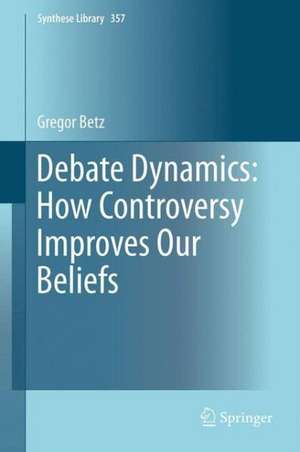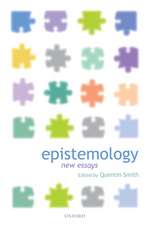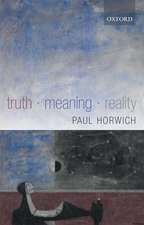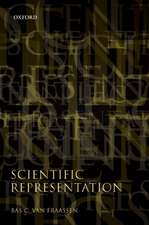Debate Dynamics: How Controversy Improves Our Beliefs: Synthese Library, cartea 357
Autor Gregor Betzen Limba Engleză Paperback – 21 sep 2014
| Toate formatele și edițiile | Preț | Express |
|---|---|---|
| Paperback (1) | 639.08 lei 6-8 săpt. | |
| SPRINGER NETHERLANDS – 21 sep 2014 | 639.08 lei 6-8 săpt. | |
| Hardback (1) | 643.34 lei 6-8 săpt. | |
| SPRINGER NETHERLANDS – 16 aug 2012 | 643.34 lei 6-8 săpt. |
Din seria Synthese Library
- 15%
 Preț: 638.43 lei
Preț: 638.43 lei - 18%
 Preț: 989.98 lei
Preț: 989.98 lei - 15%
 Preț: 596.69 lei
Preț: 596.69 lei - 18%
 Preț: 903.93 lei
Preț: 903.93 lei - 15%
 Preț: 586.88 lei
Preț: 586.88 lei - 15%
 Preț: 696.50 lei
Preț: 696.50 lei - 18%
 Preț: 892.90 lei
Preț: 892.90 lei - 15%
 Preț: 643.34 lei
Preț: 643.34 lei -
 Preț: 282.33 lei
Preț: 282.33 lei - 5%
 Preț: 372.19 lei
Preț: 372.19 lei -
 Preț: 443.10 lei
Preț: 443.10 lei - 15%
 Preț: 637.59 lei
Preț: 637.59 lei - 18%
 Preț: 958.88 lei
Preț: 958.88 lei - 15%
 Preț: 642.36 lei
Preț: 642.36 lei - 18%
 Preț: 1230.66 lei
Preț: 1230.66 lei - 15%
 Preț: 642.83 lei
Preț: 642.83 lei - 18%
 Preț: 1000.39 lei
Preț: 1000.39 lei -
 Preț: 389.70 lei
Preț: 389.70 lei - 15%
 Preț: 637.28 lei
Preț: 637.28 lei - 18%
 Preț: 952.26 lei
Preț: 952.26 lei - 18%
 Preț: 1231.32 lei
Preț: 1231.32 lei - 15%
 Preț: 645.96 lei
Preț: 645.96 lei -
 Preț: 395.85 lei
Preț: 395.85 lei -
 Preț: 400.47 lei
Preț: 400.47 lei - 18%
 Preț: 1225.48 lei
Preț: 1225.48 lei - 15%
 Preț: 638.89 lei
Preț: 638.89 lei - 18%
 Preț: 1232.09 lei
Preț: 1232.09 lei -
 Preț: 380.45 lei
Preț: 380.45 lei -
 Preț: 394.87 lei
Preț: 394.87 lei - 15%
 Preț: 640.37 lei
Preț: 640.37 lei - 15%
 Preț: 639.08 lei
Preț: 639.08 lei -
 Preț: 381.98 lei
Preț: 381.98 lei - 15%
 Preț: 643.00 lei
Preț: 643.00 lei - 15%
 Preț: 672.29 lei
Preț: 672.29 lei
Preț: 639.08 lei
Preț vechi: 751.86 lei
-15% Nou
Puncte Express: 959
Preț estimativ în valută:
122.28€ • 128.04$ • 101.43£
122.28€ • 128.04$ • 101.43£
Carte tipărită la comandă
Livrare economică 10-24 aprilie
Preluare comenzi: 021 569.72.76
Specificații
ISBN-13: 9789401784269
ISBN-10: 9401784264
Pagini: 268
Ilustrații: X, 258 p.
Dimensiuni: 155 x 235 x 14 mm
Greutate: 0.38 kg
Ediția:2013
Editura: SPRINGER NETHERLANDS
Colecția Springer
Seria Synthese Library
Locul publicării:Dordrecht, Netherlands
ISBN-10: 9401784264
Pagini: 268
Ilustrații: X, 258 p.
Dimensiuni: 155 x 235 x 14 mm
Greutate: 0.38 kg
Ediția:2013
Editura: SPRINGER NETHERLANDS
Colecția Springer
Seria Synthese Library
Locul publicării:Dordrecht, Netherlands
Public țintă
ResearchCuprins
1. General Introduction.- 2. Theory of Dialectical Structures.- Part I: Why Do We Agree? On the Consensus-conduciveness of Controversial Argumentation.- 3. Introduction to Part I.- 4. Random Debates.- 5. Background Knowledge.- 6. Four Argumentation Strategies.- 7. Argumentation Strategies in Many-proponent Debates.- 8. Core Updating.- 9. Core Argumentation.- Part II: How Do We Know? On the Truth-conduciveness of Controversial Argumentation.- 10. Introduction to Part II.- 11. Random Debates.- 12. Background Knowledge.- 13. Four Argumentation Strategies.- 14. Argumentation Strategies in Many-proponent Debates.- 15. Core Updating.- 16. Core Argumentation.- Symbols.- References.- Index.
Notă biografică
Gregor Betz is a Junior professor in Philosophy of Science at the Karlsruhe Institute of Technology. With a background in philosophy, mathematics and political sciences, he has held positions at Universität Stuttgart and Freie Universität Berlin. His research interests span philosophy of science, argumentation theory, applied ethics and the interpretation of classic philosophers.
Textul de pe ultima copertă
Is critical argumentation an effective way to overcome disagreement? And does the exchange of arguments bring opponents in a controversy closer to the truth? This study provides a new perspective on these pivotal questions. By means of multi-agent simulations, it investigates the truth- and consensus-conduciveness of controversial debates.
The book brings together research in formal epistemology and argumentation theory. Besides its consequences for discursive practice, the work may have important implications for philosophy of science and the way we construe scientific rationality, as well.
The book brings together research in formal epistemology and argumentation theory. Besides its consequences for discursive practice, the work may have important implications for philosophy of science and the way we construe scientific rationality, as well.
Caracteristici
Uses a highly innovative and original research method: multi-agent simulation of controversial debate Addresses both the practical and theoretical implications of truth- and consensus-conduciveness of controversial argumentation Is accessible to a wide audience, including scholars with no background in philosophy Relates to striving fields in philosophy, i.e. judgement aggregation, social epistemology, simulation of opinion dynamics



















